Do certain topics or situations evoke uncontrollable emotions in you? Emotional triggers can hit us all of a sudden and make us behave in extreme ways. However, there are some ways to spot emotional triggers before you start feeling uncomfortable.
You’re in a friendly, normal conversation with another person. Everything is going well until – BAM! Your blood pressure is rising, you’re starting to hyperventilate, and you have the distinct urge to strangle the other person.
Even though the other person made a blasé passing comment, you find yourself trying to prevent yourself from screaming down their throat and gouging out their eyes.
What just happened?
You got triggered – that’s what happened.
Reflecting on the situation later, you might have realized just how disproportionate your rage was, and how uncomfortably strange your reaction felt.
Almost all of us have some kind of trigger or “hot button,” that, when pushed, sets us off into a tirade of anger, hostility, fear, or resentful behavior. However, some of us are more skilled at dealing with these triggers than others.
If you’re a person who feels like a matchstick just waiting to be ignited by anyone, you might have a problem with your emotional triggers.
Related: How To Deal With Heightened Emotions When You Are An Empath? 5 Tips
What Are Emotional Triggers?
You may have heard of “trigger warnings” or “getting triggered” by another person before. But what does getting triggered actually mean?
Emotional triggers are people, words, opinions, situations, or environmental situations that provoke an intense and excessive emotional reaction within us. Common emotions that we experience while being triggered include anger, rage, sadness, and fear.
Virtually anything can trigger us, depending on our beliefs, values, and earlier life experiences such as a tone of voice, a type of person, a particular viewpoint, a single word – anything can be a trigger.
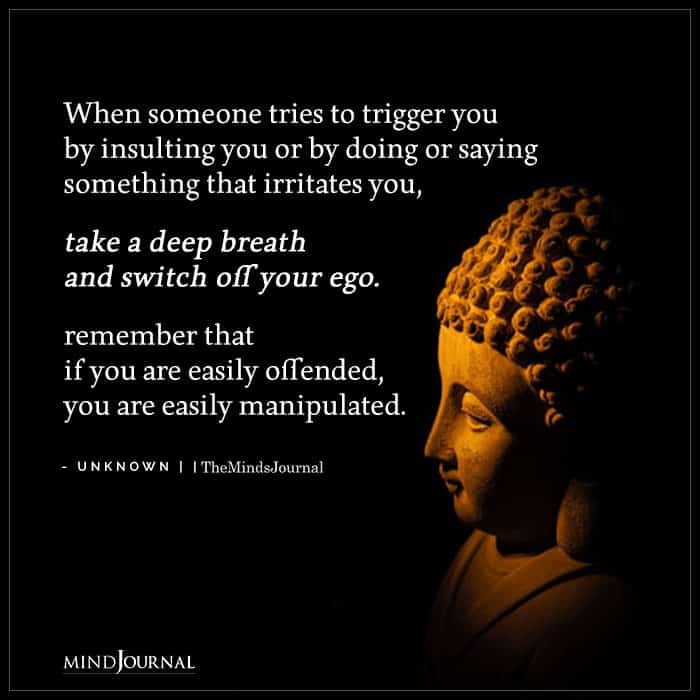
Why Do We Get Emotionally Triggered?
What is the psychology behind triggers? We suffer from emotional triggers for three main reasons:
1. Opposing beliefs and values
When we are strongly identified with a certain belief, we may find it hard to be tolerant of other opposing beliefs. For example, there’s a reason why religion is such a triggering topic for so many people: beliefs give us a sense of safety and comfort, and when they are challenged, we feel (from an emotional and psychological standpoint) like our lives are being put in danger.
Values stem from beliefs and involve what we hold as important in life. When another person disagrees or challenges our values, we get triggered because they are calling into question the truth and legitimacy of what we hold dear.
2. Trauma
Getting “triggered” is a term that traces back to the experiences of post-traumatic stress disorder (PTSD) often experienced by soldiers coming back from the war. When we are triggered due to past traumatic experiences, our reaction is often extreme fear and panic (or in some cases, anger). We get triggered when we see, hear, taste, touch, or smell something that reminds us of the previous traumatic circumstance.
For example, a rape victim might be triggered when she sees men with beards because her abuser also had a beard. A man who was assaulted by his alcoholic mother as a child might be triggered whenever he smells alcohol. An adult who never fit in as a child may feel triggered when seeing groups of people have fun.
Related: How To Turn Your Painful Emotions Into Superpowers
3. Ego preservation
The ego is the sense of self or “I” we carry around. This artificial identity that we carry is composed of thoughts, memories, cultural values, assumptions, and belief structures that we have developed in order to fit into society (read more about the ego).
We all have an ego and its primary purpose is to protect us by developing elaborate “self-protection” mechanisms in the form of beliefs, ideals, desires, habits, and addictions (in order to prevent us from facing what we fear the most: the death of ego or self).
When our egos are challenged or hurt by others, we are prone to becoming triggered – immediately. We will argue, insult, belittle, defame, backstab, sabotage, assault, and even murder (in extreme circumstances) people who pose a threat to our ego’s survival. The only way to be liberated from our egos, to experience permanent ego death, is to do some deep inner work, or soul searching.
11 Signs You’re Being Emotionally Triggered
So how can we tell when we’re being triggered? There are a few physical and emotional experiences you might have which may include:
- Trembling
- Palpitations/racing heart
- Choking feeling or trouble breathing/swallowing
- Hot flashes
- Chills
- Dizziness or faintness
- Nausea
- Chest pain/discomfort
- Feeling of detachment/unreality (known as dissociation)
- Sweating
and of course a few seconds afterward…
Intense emotions, i.e. hatred, disgust, anger, fear, terror, grief resulting in self-protective behavior such as shouting, arguing, insulting, hiding, crying, or otherwise emotionally reacting.
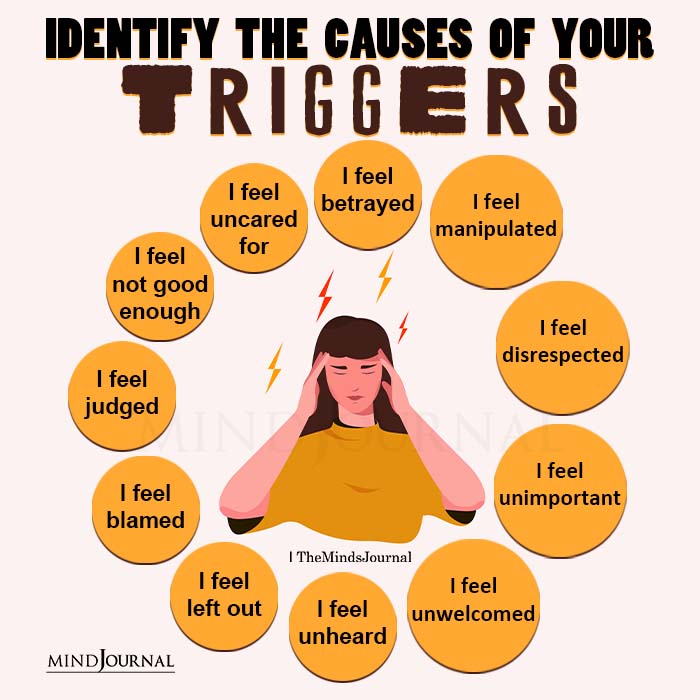
How to Identify Emotional Triggers
When we aren’t aware of our emotional triggers, let alone how to handle them, our lives follow destructive paths. I can’t tell you how many times I have seen unacknowledged triggers create suffering and chaos in people’s lives.
I’m not immune either. I’ve had some scarily intense reactions to people before. Thankfully I’m conscious of these reactions and don’t repress them … otherwise, who’s to tell what would happen!
Identifying your emotional triggers is so vital because without bringing to consciousness what provokes extreme responses from you, you’ll be a puppet constantly manipulated by your emotions. Your friendships will be strained or ruined, your relationships will be turbulent or sabotaged, and your life, in general, will be much more painful.
It really is worth putting in the effort to explore your emotional triggers.
The more aware you are, the less you will be ruled by the unconscious forces within you. And it’s not even that difficult to explore your triggers. The hardest part is actually to commit to the process.
So with that being said, here are some simple ways to identify your “hot buttons”.
Related: What To Do When Your Partner Triggers You
1. Pay attention to your bodily reactions
Notice any tensing of muscles, increased heart rate, hot or cold flashes, tingles, or any physical change that generally indicates contraction (or physically recoiling from what you’re experiencing). Turn it into a game: what is the first reaction your body has? Do your fists clench? Does your breathing accelerate? Does your face turn hot?
Mentally note these reactions and even write them down to journal about. Remember that physical reactions can be subtle all the way to an extreme – so don’t rule out anything.
2. Notice what thoughts fire through your head
Look for extreme thoughts with polarized viewpoints (i.e. someone or something is good/bad, right/wrong, nice/evil, etc.). You don’t have to do anything else but be aware of these thoughts without reacting to them. Let them play out in your mind.
What story is your mind creating about the other person or situation? I recommend simply listing these thoughts in your journal to enhance your self-awareness.
3. Who or what triggered the emotion?
Once you have become aware of your physical reactions (or in conjunction with this practice), notice who or what has triggered the extreme physical and emotional responses within you. Sometimes you will discover a single object, word, smell, or another sense-impression that triggers you. Other times, you will notice that you are triggered by a certain belief, viewpoint, or overall situation.
For example, your trigger could range from anything like loud noises to men who are overly dominating and opinionated. Not only that, but you may have a whole series of triggers (most people do), so be vigilant and open to perceiving a whole spectrum of things that set you off.
As always, it’s important that your record these triggers in some kind of journal (whether a printed one or a digital one). Writing down these triggers will help to sear them into your mind so that you remain self-aware in the future.
Related: 5 Techniques To Heal Your Emotional Triggers
4. What happened before you were triggered?
Sometimes there are certain “prerequisites” to being triggered, for example, having a stressful day at work, waking up “on the wrong side of the bed,” going to a certain uncomfortable place (like the mall), listening to the kids’ fight – virtually anything could set the stage for being triggered later on.
When you are trying to identify your emotional triggers, often you can prevent yourself from being triggered in the future simply by slowing down once you’re aware of the trigger prerequisites.
5. What needs of yours were not being met?
Being emotionally triggered always goes back to not having one or more of our deepest needs/desires met. Take some time to think about which of your needs or desires are being threatened:
- Acceptance
- Autonomy
- Attention
- Love
- Safety
- Fun
- Consistency
- Respect
- Peacefulness
- Predictability
- Being liked
- Being needed
- Being right
- Being valued
- Being treated fairly
- Being in control
Reflect on what unmet needs/desires are constantly reappearing. Looking out for and becoming aware of your body, thoughts, unmet needs/desires, and certain people or situations that set you off will help to prevent you from ‘acting out’ your emotions later.
What to Do Once You’ve Been Emotionally Triggered
Above I explored how to prevent yourself from being triggered … but what happens once you’ve already had a knee-jerk response to someone or something?
There are a number of things you can do when you’re buried deep in extreme emotions like anger or fear.
Here is what I practice and recommend:
1. Remove your attention from the person or situation and focus on your breath.
So long as you’re alive, your breath is always there with you – it is solid and trustworthy, and therefore it is an excellent way to relax.
Keep focusing on your in-breath and out-breath for a few minutes. If your attention goes back to the triggering person or situation, pull your attention back to your breathing.
Related: How To Use Your Emotional Triggers For Personal Growth
2. Take a break.
Remove yourself from the situation. Walk away for five minutes and cool down.
If you are speaking with someone, excuse yourself temporarily and say that you need to go to the bathroom or someplace else. Return when you are feeling more centered and calm.
3. Find the humor in the situation.
I’m aware that practicing this suggestion is not always possible, but you’d be surprised how much laughter and amusement lighten your perception.
When I say find the humor in the situation, I don’t mean laughing, belittling, or mocking others (or yourself). Instead, I mean looking at the situation as a whole from a bird’s eye perspective and finding the comicality of it.
4. Ask yourself why you’re being triggered.
Our emotional triggers have a way of blinding us, so to counteract that, be inquisitive. Ask yourself, “Why am I feeling so sad/angry/anxious?”
Understanding why you’re being triggered will help you to regain a sense of calmness, self-awareness, and control.
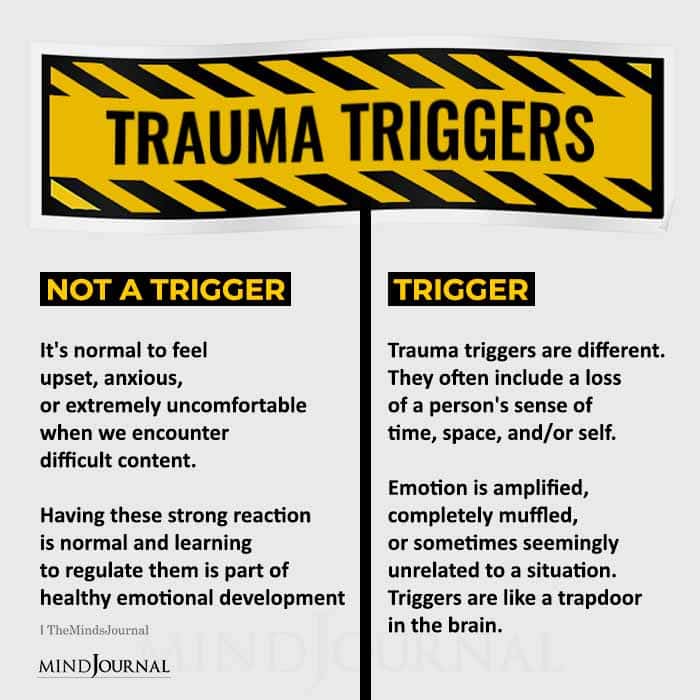
5. Don’t bypass your feelings, but don’t act them out either.
Repressing or trying to “control” your feelings isn’t the answer, however, you can delay your emotions. For instance, if you’re feeling enraged by someone, instead of exploding at them, consciously set those feelings aside to experience and unleash them later in a healthy way.
You might choose to express this anger by screaming in your room or doing an intense anger-fuelled workout. Whatever the case, be very careful about repressing your emotions. There is a fine line between consciously delaying your emotions and unconsciously suppressing them – this is why it’s so important to practice the self-awareness tips I’ve mentioned in this article.
Related: How You Can Change Your Emotional Habits
I hope that thanks to reading this article you’ll now be inspired to consciously explore your emotional triggers and prevent them from sabotaging your life.
Want to know more about how to identify your emotional triggers in relationships and how to deal with them? Check this video out below!
Written by Mateo Sol Originally appeared on Loner Wolf
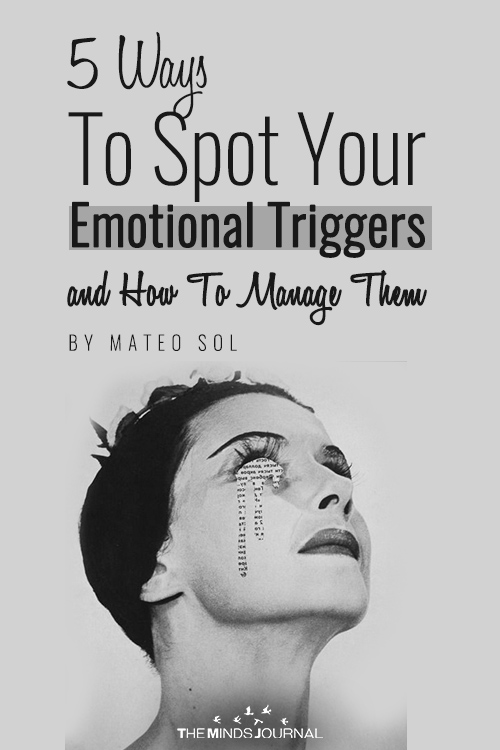
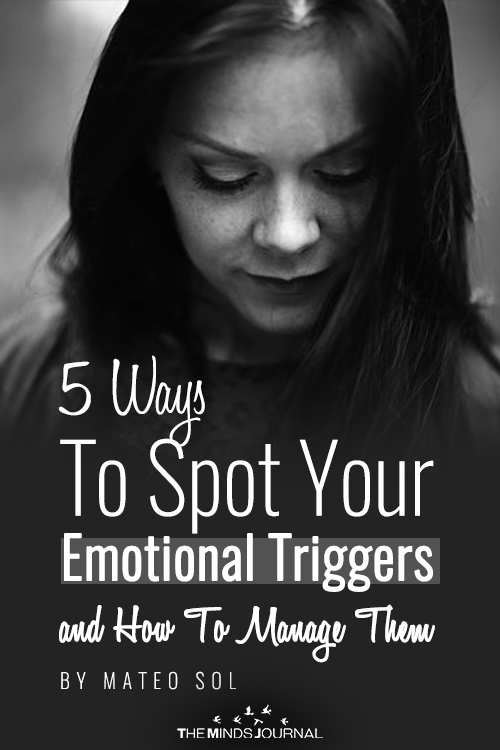
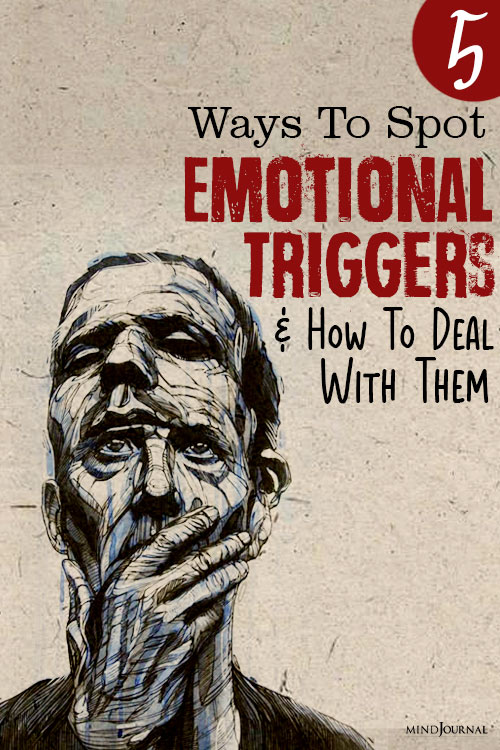



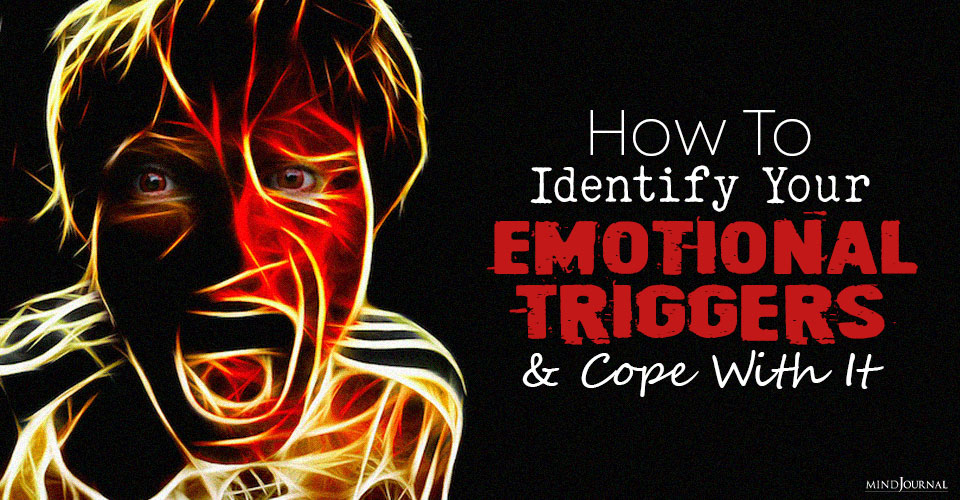







Leave a Reply